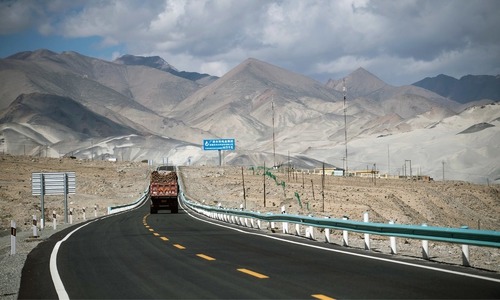
KARACHI: Minister for Planning and Development Ahsan Iqbal has announced that the long-term plan (LTP) for the China-Pakistan Economic Corridor (CPEC) that was signed on Nov 21 will be made public on Dec 18. Making the LTP public was a commitment given by the minister back in June.
In his address before hundreds of delegates gathered for the CPEC Business Opportunities Conference hosted by the Dawn Media Group here on Tuesday, he emphasised how the CPEC is a “game-changer” for Pakistan, pointing out that the pace of its implementation is accelerating and there is no room for complacency given the rapid pace of change in the world economy. “We cannot remain idle, if the world slows, we need to create new demand. There are around three billion people living in this region and 25 per cent GDP, which the CPEC will be in a position to connect.”
Highlighting the investments coming into Pakistan under the CPEC framework, the minister chose to castigate the western governments, saying that “the Chinese are doing what the Americans and the Europeans should have done after the end of the Afghan war” that evicted the Soviets from Afghanistan. “That war helped bring down the Berlin Wall, and made Europe safe. But we here in Pakistan are still paying the price for it.”
He pointed out that 85 million jobs are going to be relocated out of China to developing countries due to rising labour costs there, and Pakistan must make every effort to capture as large a share of these as possible.
The Deputy Chief of Mission at the Chinese embassy, Lijian Zhao, underlined the importance of removing bottlenecks in order to promote economic growth. He described China’s four-decade-long experience of sustained growth as unique in the history of the world, and said it was made possible only after infrastructure and energy bottlenecks were removed in the early 1980s. “Today we are doing the same thing for Pakistan through CPEC,” he went on, to applause from the auditorium.
To promote cooperation in fields of thermal power, hydropower and new energy, he said, Chinese enterprises had been engaged to invest in Pakistani energy projects and make optimal utilisation of local resources, such as Thar coal. “Investments have been made to remove the power bottleneck, reinforce the main grid structure and power transmission and distribution network, and improve power supply reliability.”
He said China energy infrastructure development projects, which are mega power plants, will help Pakistan overcome loadshedding. There are so many benefits for Pakistan through infrastructure development. Pakistan will be linked with Central Asian states, through building SEZs. Foreign investment will come that will ensure better markets, job creation, better salaries for employees, strong foreign reserves and creation of industrial parks, he said.
Shoaib Ahmed Siddiqui, Secretary, Ministry of Planning, Development and Reforms, shed light on the CPEC and said “we have to counter the notions against the project which are designed to malign this breakthrough achievement”.
Dr Ishrat Husain, former governor of the State Bank of Pakistan, in his keynote address spoke of those advancing “negative propaganda” against the CPEC, and emphasised that the best way to counter this is for the government to “release as much information as possible about CPEC.”
He said that the CPEC could add up to two percentage points to Pakistan’s GDP growth rate, but emphasised that strengthening of institutions would be crucial to realising this benefit. “SEZs will create enormous employment opportunities for our human resource. Right now, the most important thing for us is to complete these projects on time without cost overruns,” he added.
Naheed Memon, Chairperson of the Sindh Board of Investment, talked about the opportunities and said “we are here to facilitate Chinese companies and welcome their investments in infrastructure, energy and development”. She said the Chinese companies could also explore sectors as logistics, services, transport, food processing and assured full cooperation. She said government to government projects would meet the demand of Pakistan while industrial partnership would have greater impact on people’s lives. Chinese companies could also find venues in sectors of customer care and “we have raw material for their businesses as well”, she said.
Syed Nasir Hussain Shah, Information Minister of Sindh, said “we support the CPEC projects and Sindh will facilitate Chinese investors as well as local companies to invest in the province”. He welcomed and appreciated the efforts of companies which are working in materialising the CPEC projects.
Hameed Haroon, CEO of Dawn, opened with warm remarks welcoming the delegates delivered in fluent Chinese and underscored the crucial importance of long-term cooperation between China and Pakistan.
Published in Dawn, December 13th, 2017
















































